Conservatory extension ideas – 20 beautiful designs that add lots of light
Choose the right conservatory or glass extension for your home with these conservatory extension ideas that'll let light flood into your home.

Need a few gorgeous conservatory extension ideas? A conservatory or glass extension allows you to enjoy the outside in comfort all year round.
How do we define the difference? Traditionally, a conservatory has a lockable door between the structure and the main building. With an extension, there is a permanent supply of services such as heating and plumbing.
However, many conservatory companies are happy to use their design skills and expertise to create structures such as open-plan kitchens so the boundary is becoming somewhat blurred and you could approach a conservatory specialist or an architect to create the building of your choice.
Hayden Hicks, Founder of South Coast Windows explains, 'Many people want their conservatory to flow effortlessly from the house and into the garden.'
'So, it’s a good idea to match the décor and interior design to compliment this. You want your conservatory to look as organic and natural as possible, creating a seamless connection between the inside of your home and the garden. '
We round up winning ideas to add extra space and light into your home with a conservatory extension.
Conservatory extension ideas
1. Add floor to ceiling windows
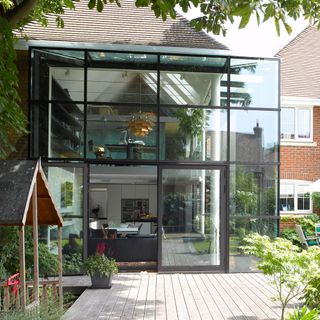
Adding a conservatory or glass extension is a great way to flood your home with natural light. Floor to ceiling windows will maximise the amount of light in the space and will make the outdoors feel like an extension of the inside.
Get the Ideal Home Newsletter
Sign up to our newsletter for style and decor inspiration, house makeovers, project advice and more.
This large glass extension makes the open plan living area of this home look ultra-modern. Spot the office of dreams looking out onto the garden – the best small home office idea.
2. Roof ventilation for a conservatory kitchen
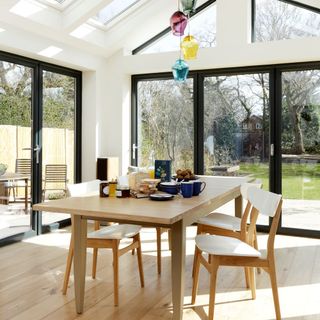
Hot air will inevitably build up inside a conservatory, even one that is open to the main body of the house. If it forms part of your kitchen, the temperature will be even greater, at times.
Thermostatically controlled roof vents with heat and rain sensors are an efficient way to release hot air on sultry days.
3. Conservatory blinds to reduce light
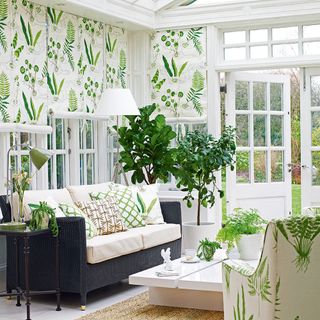
Blinds made to fit your conservatory roof - and glazed walls - will help reduce light (crucial if you want to watch television) but not heat.
It's a good idea to budget for blinds at the start of the project and shop around for conservatory blind ideas when the build is complete. Reflective coatings on glazing are generally not very effective at blocking out light.
4. Double storey conservatory extension
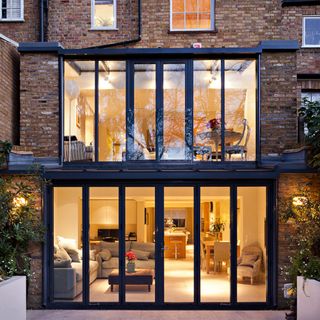
If you're lucky enough to have a townhouse with plenty of space to play with, why not think about adding a conservatory over two floors? This conservatory extension by Vivafolio, adds lots of light to the first two storeys of this Victorian terrace home.
The two storeys allows for plenty more seating areas and quiet spaces that can be used for reading nooks or a breakfast table. From the top extension, the clear glass balcony is the perfect space for relaxing with a glass of wine at the end of the day.
Michael Barnes, Managing Director of Vivafolio adds, 'Glass combines with the pure strength of aluminium with the transparency of glass to open up whole areas living space allowing light to flood in. Aluminium provides structural strength, durability, design flexibility and is endlessly recyclable.'
5. Solar tinted windows
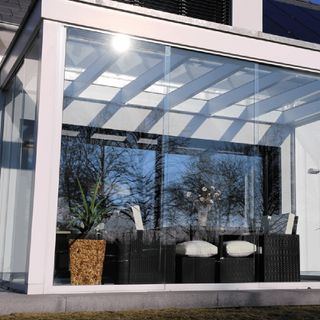
For clear views, glass is the best option for your conservatory and can be self-cleaning or solar tinted. Laminated glass and glass with safety film are good options to protect from falling debris.
Polycarbonate is cheaper but creates a more muted light and, when it rains, it can sound like 1,000 tin soldiers marching across the roof.
6. Modern glass helps reduce furniture fade
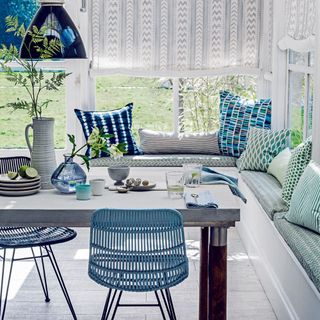
The point of a glazed room is to be able to enjoy the outside in comfort, all year round. While blinds are often necessary - to control the light, and provide some privacy - they can obviously be decorative and can add cosiness as the day turns into evening.
Over time, daylight, whether the sun is shining or not, will cause fading and distress to most surfaces but the quality of today's glass means you can use almost any kind of conservatory furniture ideas or furnishings to dress your conservatory.
7. Conservatory extension heating
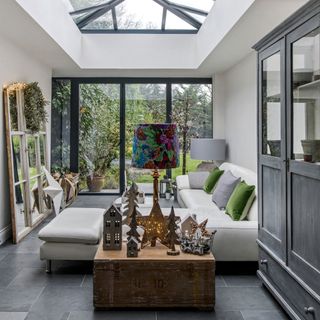
A conservatory, particularly one that is adjoined to the body of the house, needs to be suitable for year-round use, even during winter. A heating engineer will be able to calculate the correct amount of heat needed to keep yours comfortable.
Thermostatically controlled underfloor heating is the most popular option, especially with a stone flooring idea; electrical underfloor systems are more costly and less efficient. Some more traditional conservatory designs lend themselves to trench heating. Working by convection, this is installed in the floor in front of the glass and covered by a grille.
8. Blend your conservatory extension with your home
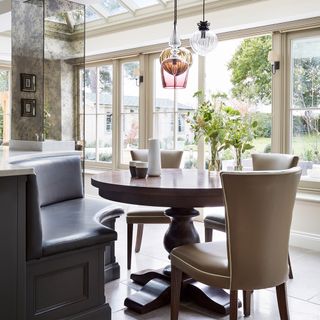
If you decide to have a bespoke-designed conservatory or glass extension idea, you could replicate features from your house - the arched windows, or a gabled roof, for example - to link the two structures.
A more sleek style, however, might work just as well as a more conventional model on, say, a tithe barn, provided the scale and silhouette are complementary.
Also, think about the location, views, storage ideas, and for large open-plan spaces, consider ways to define the internal spaces - roof lanterns above separate eating and kitchen areas, for example.
9. A natural transition between living spaces
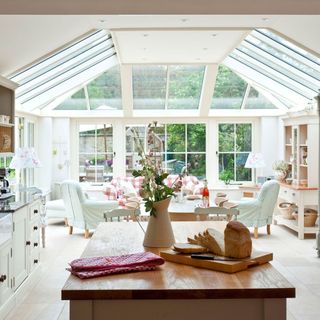
A well-designed glass extension will link with the main building neatly and simply, so that the transition between the two spaces feels natural and comfortable all year round.
Improve the flow of your home by treating the newly enlarged space as one with conservatory interior ideas; devise an interior layout of furniture and fittings that again makes the transition between the two feel seamless; using the same flooring and co-ordinated furniture throughout are simple but effective suggestions.
10. Orangery style conservatory
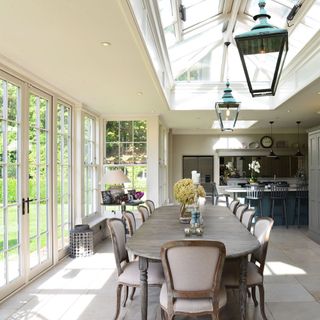
An orangery-style conservatory or glass extension, where stone or timber walls and corners are mixed with tall windows, a flat roof and a glazed roof lantern, can be a spectacular space. A great orangery idea would be to light the dining table from above - by natural light during the day and by statement lights at night.
When looking for the right company to build your conservatory, ask to see recent examples of its work, and check the materials used: aluminium or good quality timber frames are best, especially if your house is in a conservation area.
11. A side extension with floor to ceiling windows
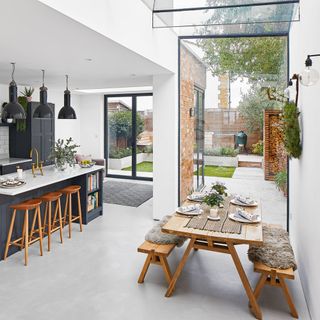
A side-return extension idea is extremely space enhancing. It is an easy and affordable way to transform a small space into something larger and more useful without impinging on the garden. The use of glass ushers in light and creates a modern feel, inside and out.
12. Full glass roof extension
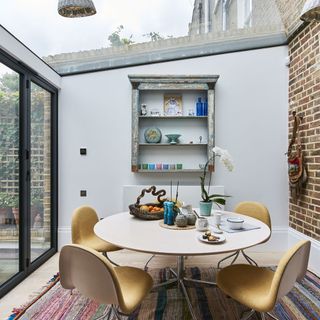
A glass-roofed living space can transform the feel of your home, and improve your sense of wellbeing; the effect of natural light on our emotional and physical state is just as positive as it is on plants and the rest of nature.
Relaxed family dining is the aim of this area, located in a beautiful glass-box extension. Easy-to-clean flooring, exposed brick and a retro style dining table and comfy chairs make this small dining room idea fuss-free, but suitably modern.
13. A conservatory dining room extension
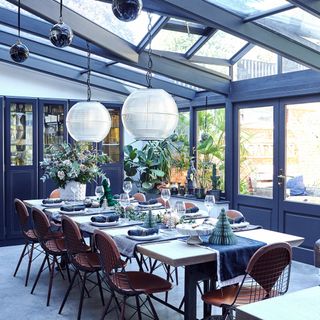
If your home lacks a space for a proper dining room, why not think of adding a conservatory dining room idea like this one? Make it feel like a proper dining room, with in-built cabinets for you favourite glassware and crockery and suspend statement lighting for intimate dinners overlooking your garden.
14. Lean-to conservatory extension
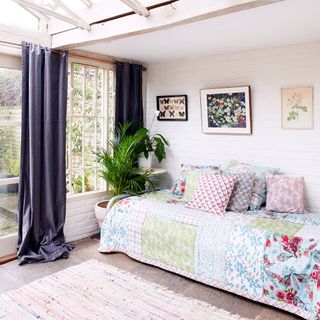
A reverse lean-to shape can fit under low eaves, suiting a cottage. In addition, a lean-to is often the most economical choice of home extension as the structure is simple yet striking, giving a smaller project the illusion of a large, light-filled open space.
Managing Director, Michael Barnes of Vivafolio adds, 'Lean to conservatories are ideal for smaller spaces, or for situations where a little extra space is required in the house without taking away too much of the garden.'
'But these are not the only cases where a lean to conservatory can make a real difference to your home. From an extension to an existing dining room or kitchen, to the addition of a sun room where you can relax and while away the hours in comfort and style, lean to conservatories have as many uses as you have ideas for them.'
15. A conservatory on an extension
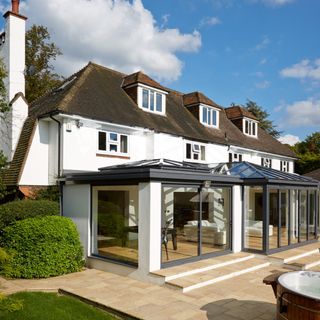
This large extension has a glass roof and an adjoining conservatory space to maximise the amount of light flooding through the house.
Bifold doors open out on to a patio where the owners can dine al fresco in the evenings and sit out on sunny days, making for the ultimate outdoor living room idea.
16. A modern bespoke glass conservatory
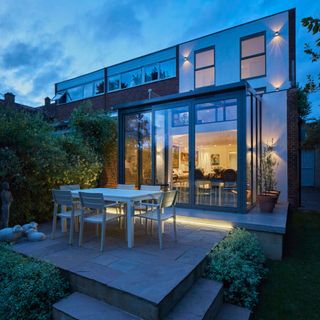
This simple, lightweight structure combines glass with aluminium minimalist frame sliding doors.
The additional conservatory style extension gives this small terrace home extra space for dining indoors and provides extra light from indoors when dining al fresco in the evening.
Is it cheaper to have an extension or conservatory?
Usually you'll save significantly more by installing a conservatory instead of building an extension. Conservatories are usually priced depending on the size and style you require, while extension costs are normally priced per square metre.
However, a builder’s estimate for the cost of an extension is really only a ballpark figure. There are many different factors which can crop up during the building process – such as drainage or foundation issues, which may require additional work. For this reason, we'd recommend factoring this into your budget and you might be safer putting some extra money aside for contingency.
It's also worth noting when making your decision on whether to build an extension or a conservatory, that usually an extension will add more value to your home than a conservatory.
How big can a conservatory be without planning permission?
To build without applying for planning permission, extensions must not exceed 50% of the total land around the house. The maximum permitted height is 4m, or 3m if it's within 2m of a boundary. The permitted depth is normally 3m on a semi-detached house and 4m on a detached.
It's good to be aware that the size of your conservatory depends on the size of the property that you're extending.

Jenny is Senior Digital Editor and joined the team in 2021, working across Ideal Home, Real Homes, Homes & Gardens, Livingetc and Gardeningetc. Since getting on the property ladder, her passion for interior design and gardening has taken on a new lease of life. She loves collecting and salvaging unique items (much to her other half's despair) but sniffing out stylish home bargains is her one true love.
-
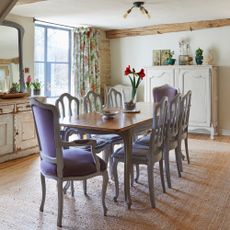 'The kitchen looked like the one out of The Tiger Who Came to Tea'
'The kitchen looked like the one out of The Tiger Who Came to Tea'A leaky, run-down space didn't put off two seasoned renovators, who could see this home's potential
By Pippa Blenkinsop
-
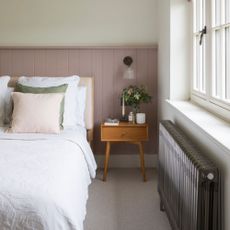 Do you sleep with one arm under your pillow? Experts warn this can mean your pillow is wrong for you
Do you sleep with one arm under your pillow? Experts warn this can mean your pillow is wrong for youHere's how to fix it
By Amy Lockwood
-
 How to mop every type of floor the right way — a foolproof 5-step process for squeaky-clean floors every time
How to mop every type of floor the right way — a foolproof 5-step process for squeaky-clean floors every timeHow to master the ultimate mopping technique
By Lauren Bradbury